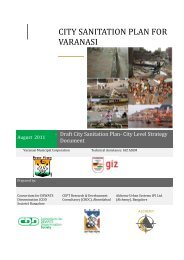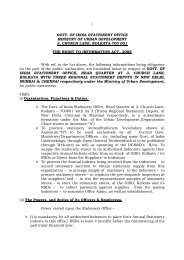CITY SANITATION PLAN - Ministry of Urban Development
CITY SANITATION PLAN - Ministry of Urban Development
CITY SANITATION PLAN - Ministry of Urban Development
Create successful ePaper yourself
Turn your PDF publications into a flip-book with our unique Google optimized e-Paper software.
BEST PRACTICES<br />
Case Study I-The first city in India where open defecation prevented in all slums<br />
<strong>CITY</strong> <strong>SANITATION</strong> <strong>PLAN</strong> BAREILLY<br />
Tiruchirappalli City Corporation –the first city in India where open defecation prevented in all slums<br />
Gramalaya’s work is focused on implementation and filling critical knowledge gaps in the sector, up<br />
scaling community based pro poor approaches through our program and advocacy work. The 2001<br />
census <strong>of</strong> India put urban sanitation coverage at 61 percent <strong>of</strong> the population having access to<br />
individual or public toilets. Low coverage <strong>of</strong> urban sanitation is due to the inability <strong>of</strong> planned urban<br />
development to provide for sanitation access to the urban poor. Gramalaya started its urban<br />
intervention in the 186 slums <strong>of</strong> Tiruchirappalli City Corporation as the operational area aiming at<br />
declaring open defecation free zone. The involvement <strong>of</strong> community based organizations in the<br />
project coupled with City Corporation support in providing Integrated Sanitatary complexes (ISPs),<br />
<strong>of</strong>fering vacant sites for constructing community toilets with WaterAid, UK funding enabled the<br />
project a successfully demonstrated model.<br />
Gramalaya played an active role in declaring India’s first slum Kalmandhai as open defecation free<br />
(ODF) slum in Tiruchirappalli City Corporation in theyear 2002 followed by 168 slums as ODF<br />
announced with the support <strong>of</strong> Trichy City Corporation and donor agencies. This has resulted in<br />
conversion <strong>of</strong> dry earth latrines into modern flush out community toilets and eradication <strong>of</strong> manual<br />
scavenging in the city. In Tiruchirappalli city Corporation, 126 slum Communities are maintaining<br />
sanitary complexes under pay and use system with the support city Corporation. The Corporation<br />
handed over the toilets to women self help groups after new construction or renovation <strong>of</strong> the toilet.<br />
The Corporation gave the permission letter to the groups for running the community managed toilet<br />
under pay and use system. The Gramalaya experience proved that adequate involvement <strong>of</strong><br />
community and training in maintenance <strong>of</strong> public toilets and earning from user charge is a revenue<br />
model for the slum communities with sustainable approach. It also generates tremendous confidence<br />
among women to partake in slum welfare and day-to-day decision making.<br />
The review <strong>of</strong> Community managed toilets and bathing complexes in Tiruchirapalli, six years after the<br />
ADMINISTRATIVE STAFF COLLEGE OF INDIA, HYDERABAD Page 212
















